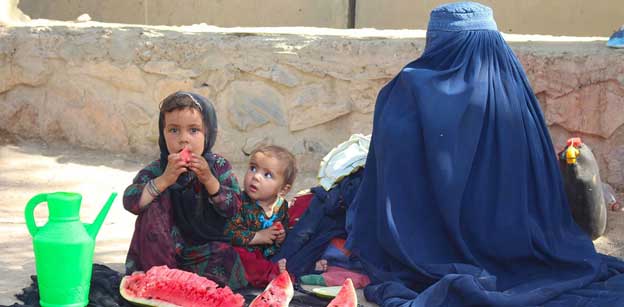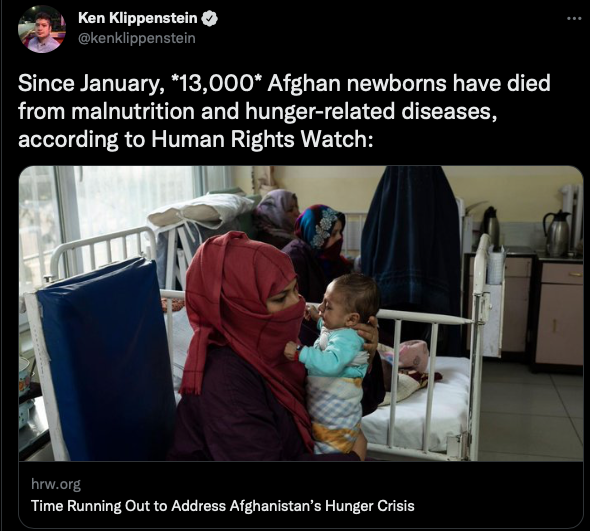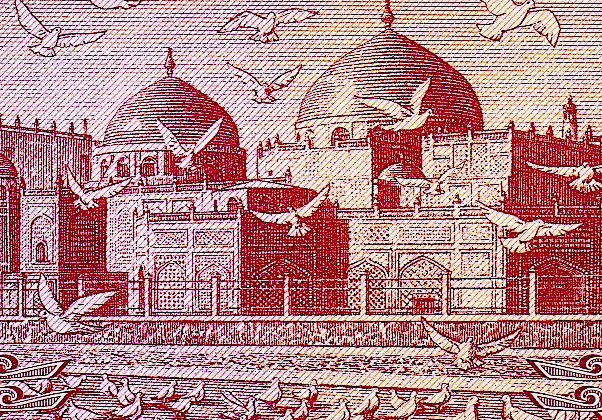What the U.S. left behind: Baher Kamal reports on the widespread misery left in the wake of the 20-year brutal war by the U.S.-led military coalition.

A woman and her children fled conflict in Lashkargah and now live in a displaced persons camp in Kandahar, southern Afghanistan. (UNICEF Afghanistan)
By Baher Kamal
Inter Press Service
Following 20 long years (2011-2021) of brutal war on Afghanistan by the U.S.-led military coalition, which ended up delivering the country to the Taliban in August 2021, 23 million Afghans now face a devastating humanitarian crisis: severe and acute hunger, economic bankruptcy, healthcare system collapse and unbearable family indebtedness.
People in Afghanistan are today facing a food insecurity and malnutrition crisis of “unparalleled proportions,” Ramiz Alakbarov, deputy special representative for the U.N. secretary general, reported on March 15.
“The rapid increase in those experiencing acute hunger – from 14 million in July 2021 to 23 million in March 2022 – has forced households to resort to desperate measures such as skipping meals or taking on unprecedented debt to ensure there is some food on the table at the end of the day.”
“These unacceptable trade-offs have caused untold suffering, reduced the quality, quantity, and diversity of food available, led to high levels of wasting in children, and other harmful impacts on the physical and mental wellbeing of women, men, and children,” the U.N. high official warned.
[Human Rights Watch reported last week that 1-in-10 newborns have died since the start of this year, 13,000 in total.]

In Afghanistan, a staggering 95 per cent of the population is not eating enough food, with that percentage rising to almost 100 per cent for female-headed households. It is a figure so high that it is almost inconceivable. Yet, devastatingly, it is the harsh reality, added Alakbarov.
Hospital wards are filled with children suffering from malnutrition: smaller than they should be, many weighing at one year what an infant of six months would weigh in a developed country, and some so weak they are unable to move.
Facing Debt
As Afghanistan continues to grapple with the effects of a terrible drought, the prospect of another bad harvest this year, a banking and financial crisis so severe that it has left more than 80 percent of the population facing debt, and an increase in food and fuel prices, the crisis reality facing communities cannot be ignored. Enormous challenges lie ahead, said the U.N. humanitarian coordinator for Afghanistan.
[Related: The U.S. seized half of Afghanistan’s frozen assets, which could alleviate the suffering: Biden Denounced for Seizing Afghan Assets]
“Acute malnutrition rates in 28 out of 34 provinces are high with more than 3.5 million children in need of nutrition treatment support. Afghanistan’s health system is on the brink of collapse. Unless urgent action is taken, the country faces an imminent humanitarian catastrophe, warned the U.N. top humanitarian official, Martin Griffiths, last September, that’s just one month after the U.S.-led military coalition abandoned the country in a sudden, chaotic withdrawal.
“Allowing Afghanistan’s health care delivery system to fall apart would be disastrous,” said Griffiths, the U.N. undersecretary-general for humanitarian affairs and emergency relief coordinator.
“People across the country would be denied access to primary healthcare such as emergency caesarean sections and trauma care,” she said.
Combined Shocks
The combined shocks of drought, conflict, Covid-19 and an economic crisis in Afghanistan, have left more than half the population facing a record level of acute hunger, according to a U.N. assessment published at the end of last October.
An Integrated Food Security Phase Classification (IPC) report co-led by the Food and Agriculture Organization (FAO) and World Food Program (WFP), revealed by the end of last October that the lives, livelihoods and access to food for 22.8 million people will be severely impacted.
“It is urgent that we act efficiently and effectively to speed up and scale up our delivery in Afghanistan before winter cuts off a large part of the country, with millions of people –including farmers, women, young children and the elderly – going hungry in the freezing winter”, FAO Director-General QU Dongyu said at the time. “It is a matter of life or death.”
The IPC report found that more than 1-in-2 Afghans would face Phase 3 crisis or Phase 4 emergency levels of acute food insecurity from November through the March lean season, requiring an urgent international response to prevent a humanitarian catastrophe. This is the highest number of acutely food insecure people ever recorded by the U.N., during 10 years of conducting IPC analyses in Afghanistan.
Globally, the country is home to one of the largest numbers of people facing acute hunger.
Children Dying
“Hunger is rising and children are dying”, the WFP Executive Director David Beasley said in October. “We can’t feed people on promises – funding commitments must turn into hard cash, and the international community must come together to address this crisis, which is fast spinning out of control.” The report revealed a 37 percent surge in the number of Afghans facing acute hunger since its last assessment in April.
Last month, WFP and the U.N. Children’s Fund (UNICEF) warned that without immediate life-saving treatment, one million children risked dying from severe acute malnutrition.
And for the first time, urban residents are suffering from food insecurity at similar rates to rural communities.
Meanwhile, rampant unemployment and a liquidity crisis are putting all major urban centers in danger of slipping into a Phase 4 emergency level of food insecurity, including formerly middle class populations.
In rural areas, the severe impact of a second drought in four years continues to affect the livelihoods of 7.3 million people who rely on agriculture and livestock to survive.
This has been the horrifying cost of another brutal war on unarmed human beings.
Baher Kamal is senior adviser to the IPS director general on Africa and the Middle East. He is an Egyptian-born, Spanish-national, secular journalist, with over 43 years of experience. Since the late 1970s, he has specialized in all development related issues, as well as international politics.
This article is from Inter Press Service.
The views expressed are solely those of the author and may or may not reflect those of Consortium News.


The US is dying and is lashing out, flailing and wailing trying to preserve it’s dominion over countless millions of people. It’ can’t happen soon enough. I hope that this last war they have started in Ukraine will deliver to the US and the “entitled” west what they all deserve. It has been suggested that the US has shot itself in the foot and backed itself into a corner over the last illegal sanctions against Russia. The war in Ukraine could so easily have been averted as was the War OF Terror on Afghanistan. It was never our business to invade Afghanistan, I can only hope that the Taliban can right the wrongs of US occupation and it’s corrupt puppet Afghan govt. They have been fighting this war for twenty years and it’s not too late to build bridges with countries outside of the US and it’s lackies spheres of influence – they need to. They started out with good intentions back in 2001, I hope they remember why they were fighting this war and to what end.
Our elite is morally and intellectually as corrupt as the Nazis were. they will all unite in hell.
Twodays ago, the war criminal and the former secretary of state Madeline Albright died and went to hell, she was famous( or Infamous). For her statement that the death of 500 000 Iraqi children was a price worth to pay for applying sanctions on Saddam.
There is nothing changed in this empire of evil other than the fact that it’s genocidal crimes are ever getting bigger and more devastating, and nowadays, many poor and devastated countries are living under the evil sanctions of demonic America, Afghanistan, Yemen, Somalia, Lebanon, Venezuela and many more, suffering from hunger and diseases,
America carries the heavy load of the most horrible genocidal crimes against humanity side it’s creation, and I hope that soon it will collapse and get crushed under this mountains of evil legacy.
We are crippling Putin’s war machine by denying him access to the money & support he needs to fund his illegal war. – Liz Truss
Statements like this from the increasingly clueless Brits stand in stark contrast to this article about the effects of an even more illegal war waged by that master of the universe, the US, with it’s vassals (the EU) and its foreign legion (NATO). Plausibly the world would be a better place today if the likes of Britain had denied support to the real war machine on the planet, the American one, instead of chasing after the country that spends a tenth of what the US war machine is funded to.
And not a single sanction imposed – same goes for so many other countries left devastated by the USofA.